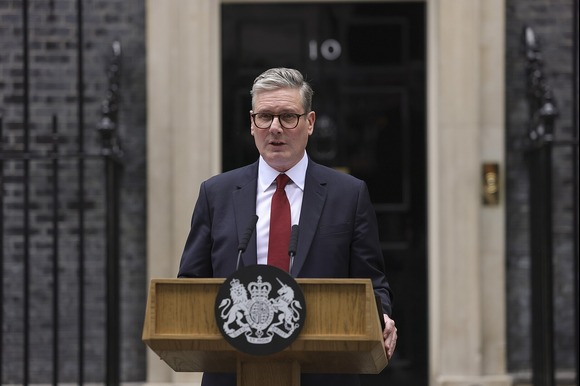Reform UK has outlined a sweeping immigration policy that would see as many as 600,000 migrants deported over five years if the party came to power at the next general election.
Leader Nigel Farage said the party would deny anyone arriving in the UK via small boats the right to claim asylum, under a programme it has branded Operation Restoring Justice. Speaking at the launch, Farage insisted the “only way” to stop Channel crossings was by “detaining and deporting absolutely anyone who comes via that route.”
He added: “If we do that, the boats will stop coming in days because there will be no incentive.”
The party pledged £2bn to support its strategy, including payments or aid to countries such as Afghanistan willing to accept the return of migrants, while warning of sanctions against governments that refuse.
Although Farage had previously described mass deportations as a “political impossibility,” he now says Reform has developed “a credible plan” to deport “hundreds of thousands of people over the five years of a Reform government.” At the event, Reform UK chair Zia Yusuf said deporting between 500,000 and 600,000 people in one parliamentary term was “totally” achievable.
However, the party has not clarified what share of that total would apply to new arrivals or to people already living in the UK without legal status. Yusuf claimed there were “north of 650,000 adults” currently residing illegally in the country, although he admitted it was an attempt to “count the uncountable.” Farage added that “common sense” would need to guide how the policy was applied.
Citing Australia’s approach, Reform argued that tough deportation measures had successfully deterred illegal arrivals there and could be applied in Britain. The proposals would represent an enormous expansion of removals compared to current levels. Official data shows there were 10,652 asylum-related returns in the year to June.
Under Reform’s plan, migrants arriving on small boats would be arrested, held at disused RAF bases, and, if bilateral deals were struck, sent back to their countries of origin, including Afghanistan and Eritrea—two of the most common source nations. The party also wants to construct new removal centres in remote parts of the UK with capacity for up to 24,000 people within 18 months.
It further proposes housing migrants in countries such as Rwanda and Albania, or even in British overseas territories such as Ascension Island, if immediate deportation was not possible. Charter deportation flights would be scaled up to as many as five per day.
Migrants would also be given the option of voluntary return, incentivised by a £2,500 payment under what Reform describes as a “carrot and stick” approach. The party estimates the programme would cost £10bn over five years but claims savings would be made by reducing spending on hotels and other asylum-related expenses.
Central to the plan is new legislation—the Illegal Migration (Mass Deportation) Bill. The law would impose a duty on the home secretary to deport illegal migrants and would permanently ban those deported from ever re-entering the UK.
The bill would also “disapply” international treaties such as the 1951 Refugee Convention, which bars signatories from sending refugees back to countries where they face serious threats, and the European Convention on Human Rights (ECHR), which has frequently been invoked to halt deportations. Reform says it would replace the Human Rights Act with a new British Bill of Rights applying only to UK citizens and those with legal residency.
The proposals have been met with strong criticism. Labour dismissed them as “unworkable,” with housing minister Matthew Pennycook arguing that the plans depended on striking deals with countries unlikely to cooperate. “What happens if Reform cannot negotiate returns agreements with the Taliban in Afghanistan?” he asked, warning the approach risked inflaming tensions rather than solving the problem.
The Conservatives accused Reform of simply recycling ideas they themselves had already put forward. Shadow home secretary Chris Philp said the Tories had already produced legislation to disapply the Human Rights Act in immigration cases and to deport illegal arrivals, dismissing Reform’s plan as a “copy and paste” version.
Liberal Democrat deputy leader Daisy Cooper said the policy “crumbles under the most basic scrutiny,” accusing Reform of misleading the public with claims it could easily create detention capacity and deportation deals abroad.
The debate comes as Channel crossings hit record levels. So far this year, 28,288 people have arrived in small boats—46% higher than at the same point in 2024. A record 111,000 asylum applications were made in the year to June, and since 2020, nearly 189,000 irregular arrivals have been recorded, mostly via small boats.
Most migrants have come from Afghanistan, Syria, Eritrea, Iran and Sudan.
Since taking office in July last year, the Labour government has promised to tackle the issue by targeting people-smuggling gangs. Ministers are also preparing to launch a “one in, one out” pilot deal with France, under which the UK will return migrants caught crossing the Channel and accept an equal number of asylum seekers from France who have not attempted the journey and pass security checks.






